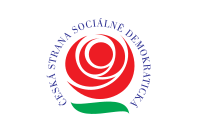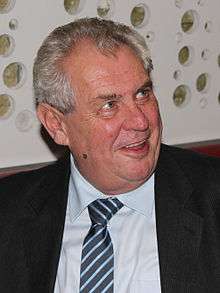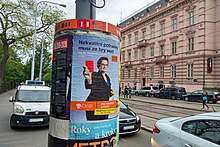Czech Social Democratic Party
The Czech Social Democratic Party (Czech: Česká strana sociálně demokratická, ČSSD) is a social-democratic[3][4][5] political party in the Czech Republic. It holds 15 seats in the Chamber of Deputies following the 2017 legislative election in which the party lost 35 seats. The party has been led by Jan Hamáček since 2018. It has been a junior coalition party within a minority cabinet since June 2018, and was a senior coalition party from 1998 to 2006 and from 2013 to 2017.
Czech Social Democratic Party Česká strana sociálně demokratická | |
|---|---|
 | |
| Leader | Jan Hamáček |
| Deputy Leaders | Roman Onderka Michal Šmarda Jana Maláčová Ondřej Veselý Tomáš Petříček |
| Chamber of Deputies Leader | Jan Chvojka |
| Senate Leader | Petr Vícha |
| Founder | Josef Boleslav Pecka |
| Founded | 7 April 1878 |
| Headquarters | Lidový dům, Hybernská 7, Prague |
| Think tank | Masaryk Democratic Academy[1] |
| Youth wing | Young Social Democrats |
| Women's wing | Social Democratic Women |
| Religious wing | Christian Social Platform |
| Membership (2019) | 13,845[2] |
| Ideology | Social democracy[3][4][5][6] Pro-Europeanism[7][8] |
| Political position | Centre-left[9] |
| European affiliation | Party of European Socialists |
| International affiliation | Progressive Alliance Socialist International |
| European Parliament group | Progressive Alliance of Socialists and Democrats |
| Colours | Orange Red |
| Slogan | Freedom, Justice, Solidarity |
| Chamber of Deputies | 14 / 200 |
| Senate | 13 / 81 |
| European Parliament | 0 / 21 |
| Regional councils | 125 / 675 |
| Governors of the regions | 5 / 13 |
| Local councils | 1,882 / 61,892 |
| Party flag | |
 | |
| Website | |
| www | |
The ČSSD is a member of the Party of European Socialists, the Socialist International and the Progressive Alliance. Its members are divided into two prominent groups:[10] a liberal wing consisting predominantly of progressive[10] and social-liberal members, and a conservative wing often described as social-conservative[11] and left-wing nationalist.[12]
History
The Social Democratic Czechoslavonic party in Austria (Czech: Sociálně Demokratická strana Českoslovanská v Rakousku) was a political group founded on 7 April 1878 in Austria-Hungary as a regional wing of the Social Democratic Party of Austria. Founded in Břevnov atop earlier social democratic initiatives, such as the Ouls, it represented much of the Kingdom of Bohemia in the Austrian parliament, and its significant role in the political life of the empire was one of the factors that led to the creation of an independent Czechoslovakia. After the collapse of Austria-Hungary at the end of the First World War, the party became one of the leading parties of the first Czechoslovak Republic. Its members were split over whether to join the Comintern, which in 1921 resulted in the fracturing of the party, with a large part of its membership then forming the new Communist Party of Czechoslovakia.

During the occupation of Czechoslovakia by Nazi Germany, the party was officially abolished, but its members organized resistance movements contrary to the laws of the German-controlled Protectorate of Bohemia and Moravia, both at home and abroad. After the re-establishment of the Czechoslovak Republic in 1945, the party returned to its pre-war structure and became a member of the National Front which formed a new governing coalition. In 1948, after the Communist Party of Czechoslovakia gained a parliamentary majority, the Czech Social Democratic Party was incorporated into the Communist Party. At the time of the Prague Spring, a reformist movement in 1968, there were talks about allowing the recreation of a Social Democratic party, but Soviet intervention put an end to such ideas. It was only after the Velvet Revolution of 1989 that the party was recreated. Since the dissolution of Czechoslovakia, which came into effect on 1 January 1993, the ČSSD has been one of the major political parties of the Czech Republic, and until October 2017 was always one of the two parties with the largest number of seats in the Chamber of Deputies.
At the 1998 parliamentary election, the party won the largest number of seats but failed to form a coalition government, so formed a minority government under its leader Miloš Zeman. With only 74 seats out of 200, the government had confidence and supply from the Civic Democratic Party (ODS), under the so-called Opposition Agreement.
At the elections of 2002, the party gained 70 of the 200 seats in the of Deputies of the Czech Republic Chamber of Deputies. Its leader Vladimír Špidla became prime minister, heading a coalition with two small centre-right parties, the Christian and Democratic Union – Czechoslovak People's Party (KDU–ČSL) and the Freedom Union – Democratic Union (US-DEU) until he was forced to resign in 2004 after the ČSSD lost in the European Parliament elections of 2004
The next leader was Stanislav Gross, serving as leader from 26 June 2004 to 26 April 2005 and as prime minister from 4 August 2004 to 25 April 2005. He resigned after a scandal when he was unable to explain the source of money used to buy his house.
The successor of Gross as prime minister was Jiří Paroubek, while Bohuslav Sobotka became acting party leader from 26 April 2005 to 13 May 2006. Paroubek was then elected as the new party leader in the run-up to the June 2006 elections, at which the party won 32.3% of the vote and 74 out of 200 seats. The election at first caused a stalemate, since the centre-right parties plus the Green Party and the centre-left parties each had exactly 100 seats. The stalemate was broken when two ČSSD deputies, Miloš Melčák and Michal Pohanka, abstained during a vote of confidence, allowing a coalition of the Civic Democrats (ODS), the KDU-ČSL, and the Green Party to form a government. Hence the ČSSD went into opposition.
At the 2010 legislative elections on 28 and 29 May, the ČSSD gained 22.08% of the vote but remained the largest party, with 56 seats. Failing to form a governing coalition, it remained in opposition to a government coalition of the ODS, conservative TOP 09 and conservative-liberal Public Affairs parties. Paroubek resigned as leader on 7 June and was succeeded by Sobotka.
The Party remained the largest Party even after the 2013 legislative election of 25 and 26 October 2013 and in December formed a governing coalition with the populist ANO 2011 and the centrist Christian and Democratic Union – Czechoslovak People's Party.[13] The leader of ČSSD, Bohuslav Sobotka, became the new Prime Minister of the Czech Republic.
The party suffered heavy losses in the 2017 legislative election and was reduced to only 15 seats, the worst result in its history. ČSSD suffered another defeat in the Prague Municipal, local and Senate elections in 2018. ČSSD lost 12 senators (only one managed to win re-election), all Prague deputies and more than half of their local councillors. In 2019 ČSSD lost all their representatives in the European Parliament. Some political commentators have interpreted the string of poor results as a sign of ČSSD losing their position in national politics.[14]
Symbols
Logos
 Party logo, 1945–1948 (1948-1990 in-exile)
Party logo, 1945–1948 (1948-1990 in-exile) Party logo, 1998–2011
Party logo, 1998–2011 Current logo
Current logo
Policy positions
In economic matters, the ČSSD party platform is typical of Western European social democratic parties. It supports a mixed economy, a strong welfare state, and progressive taxation.
In foreign policy it supports European integration, including joining the eurozone, and is critical of US foreign policy, especially when in opposition—though it does not oppose membership of the Czech Republic in NATO.

Name of the party over time
Czech lands as part of Austria-Hungary:
- 1878–1893 The Czechoslavonic Social Democratic Party in Austria (Sociálně-demokratická strana českoslovanská v Rakousku) – part of Social Democratic Party of Austria
- 1893–1918 The Czechoslavonic Social Democratic Workers' Party (Českoslovanská sociálně demokratická stranu dělnická) – independent party
- 1918–1938 The Czechoslovak Social Democratic Workers' Party (Československá sociálně demokratická strana dělnická) – merged with Slovak Social Democrats. The party was a member of the Labour and Socialist International between 1923 and 1938.[15] After the splitup of Austria-Hungary, the Czechoslovak Social Democratic Workers Party in the Republic of Austria split from the main party.
- 1938–1941 The National Labor Party (Národní strana práce) – united left party of Social Democrats and part of Czechoslovak National Socialist Party
- 1945–1948 Czechoslovak Social Democracy (Československá sociální demokracie)
- 1948–1989 – merged with the Communist Party of Czechoslovakia, concurrently existed as an exile party with its headquarters in London
- 1990–1993 Czechoslovak Social Democracy (Československá sociální demokracie)Former Party Leader and Prime Minister Bohuslav Sobotka (on the right) and current Party leader and Interior Minister Jan Hamacek
- since 1993 Czech Social Democratic Party (Česká strana sociálně demokratická)
Election results
Czechoslovakia wide elections
Legislative elections
| Date | Leader | Votes | Seats | Position | |||
|---|---|---|---|---|---|---|---|
| # | % | # | ± | Size | |||
| 1920 | Antonín Němec | 1,590,520 | 25.7 | 74 / 300 |
1st | Coalition | |
| 1925 | Antonín Hampl | 632,403 | 8.9 | 25 / 300 |
4th | Coalition | |
| 1929 | Antonín Hampl | 963,462 | 13 | 39 / 300 |
2nd | Opposition | |
| 1935 | Antonín Hampl | 1,032,773 | 12.6 | 38 / 300 |
3rd | Coalition | |
| 1946 | Zdeněk Fierlinger | 855,771 | 12.1 | 37 / 300 |
5th | Coalition | |
| 1948 | as part of National Front | 23 / 300 |
3rd | Bloc | |||
| 1954 | Illegal. Merged into Communist Party. De jure in-exile. | ||||||
| 1960 | |||||||
| 1964 | |||||||
| 1971 | |||||||
| 1976 | |||||||
| 1981 | |||||||
| 1986 | |||||||
| 1990 | Jiří Horák | 342,455 | 3.2 | 0 / 150 |
9th | No seats | |
| 1992 | Valtr Komárek & Alexander Dubček |
648,125 | 6.8 | 10 / 150 |
4th | Opposition | |
Devolved assembly elections
Czech assembly elections
| Date | Leader | Votes | Seats | Position | |||
|---|---|---|---|---|---|---|---|
| # | % | # | ± | Size | |||
| 1990 | Jiří Horák | 296,165 | 4.11 | 0 / 200 |
6th | No seats | |
| 1992 | Jiří Horák | 422,736 | 6.53 | 16 / 200 |
3rd | Opposition | |
Slovak assembly elections
| Date | Leader | Votes | Seats | Position | |||
|---|---|---|---|---|---|---|---|
| # | % | # | ± | Size | |||
| 1928 | Ivan Dérer | 96,901 | 7.33 | 4 / 54 |
4th | – | |
| 1935 | Ivan Dérer | – | 11.3 | 4 / 54 |
5th | – | |

Czech Republic wide elections
Legislative elections
| Date | Leader | Votes | Seats | Position | |||
|---|---|---|---|---|---|---|---|
| # | % | # | ± | Size | |||
| 1996 | Miloš Zeman | 1,602,250 | 26.4 | 61 / 200 |
2nd | gov′t support | |
| 1998 | Miloš Zeman | 1,928,660 | 32.3 | 74 / 200 |
1st | Minority | |
| 2002 | Vladimír Špidla | 1,440,279 | 30.2 | 70 / 200 |
1st | Coalition | |
| 2006 | Jiří Paroubek | 1,728,827 | 32.3 | 74 / 200 |
2nd | Opposition (2006–2009) | |
| Coalition (2009–2010) | |||||||
| 2010 | Jiří Paroubek | 1,155,267 | 22.1 | 56 / 200 |
1st | Opposition | |
| 2013 | Bohuslav Sobotka | 1,016,829 | 20.5 | 50 / 200 |
1st | Coalition | |
| 2017 | Lubomír Zaorálek | 368,347 | 7.3 | 15 / 200 |
6th | Opposition (2017–2018) | |
| Coalition (since 2018) | |||||||
.jpg)
Senate
1996 whole Senate elected (81 seats), in next elections only one third of seats to be contested
| Election | First round | Second round | Seats | Total Seats | Notes | |||||
|---|---|---|---|---|---|---|---|---|---|---|
| Votes | % | Runners-up | Place* | Votes | % | Place* | ||||
| 1996 | 559,304 | 20.3 | 48 / 81 | 2nd | 733,713 | 31.8 | 2nd | 25 / 81 | 25 / 81 | The whole Senate was elected. Only one third of Senate was elected in all subsequent elections. |
| 1998 | 208,845 | 21.7 | 5 / 27 | 3rd | 121,700 | 22.7 | 3rd | 3 / 27 | 23 / 81 | |
| 1999 | 327 | 1.0 | 0 / 1 | 5th | 0 / 1 | 23 / 81 | By-election in Prague 1 district. | |||
| 2000 | 151,943 | 17.7 | 5 / 27 | 3rd | 53,503 | 9.5 | 5th | 1 / 27 | 15 / 81 | |
| 2002 | 122,397 | 18.4 | 14 / 27 | 2nd | 224,386 | 27.3 | 2nd | 7 / 27 | 11 / 81 | |
| 2003 | 2,424 | 6.8 | 0 / 2 | 6th | 0 / 2 | 11 / 81 | By-elections in Strakonice and Brno-city district. | |||
| 2004 | 5,203 | 14.7 | 1 / 2 | 3rd | 5,358 | 20.51 | 3rd | 0 / 2 | 11 / 81 | By-elections in Prague 4 and Znojmo districts. |
| 2004 | 90,446 | 12.5 | 3 / 27 | 4th | 24,923 | 5.2 | 4th | 0 / 27 | 7 / 81 | |
| 2006 | 204,573 | 19.2 | 11 / 27 | 2nd | 120,127 | 20.9 | 2nd | 6 / 27 | 13 / 81 | |
| 2007 | 6,456 | 21.66 | 1 / 2 | 1st | 4,338 | 21.54 | 2nd | 1 / 2 | 13 / 81 | By-elections for Chomutov and Přerov |
| 2008 | 347,759 | 33.2 | 26 / 27 | 1st | 459,829 | 55.9 | 1st | 23 / 27 | 29 / 81 | |
| 2010 | 290,090 | 25.3 | 22 / 27 | 1st | 299,526 | 44.0 | 1st | 12 / 27 | 41 / 81 | |
| 2011 | 12,088 | 44.3 | 1 / 1 | 1st | 13,505 | 65.1 | 1st | 1 / 1 | 41 / 81 | By-election in Kladno district |
| 2012 | 199,957 | 22.7 | 23 / 27 | 1st | 207,064 | 40.3 | 1st | 13 / 27 | 46 / 81 | |
| 2014 | 3,695 | 16.1 | 0 / 1 | 3rd | 0 / 1 | 46 / 81 | By-election in Zlín district | |||
| 2014 | 226,239 | 22.0 | 19 / 27 | 1st | 165,629 | 35.0 | 1st | 10 / 27 | 33 / 81 | |
| 2014 | 2,092 | 16.8 | 1 / 1 | 1st | 3,664 | 50.9 | 1st | 1 / 1 | 33 / 81 | By-election in Prague 10 district, Ivana Cabrnochová was a Green Party candidate supported by ČSSD |
| 2016 | 128,875 | 14.6 | 9 / 27 | 2nd | 55,622 | 13.1 | 3rd | 2 / 27 | 25 / 81 | |
| 2018 | 1,294 | 5.7 | 0 / 1 | 6th | 0 / 1 | 25 / 81 | By-election in Trutnov district. | |||
| 2018 | 1,270 | 7.5 | 0 / 1 | 6th | 0 / 1 |
25 / 81 | By-election in Zlín district. | |||
| 2018 | 100,478 | 9.2 | 5 / 27 | 3rd | 33,887 | 8.10 | 6th | 1 / 27 | 13 / 81 | |
Presidential
| Indirect Election | Candidate | First round result | Second round result | Third round result | |||||||
|---|---|---|---|---|---|---|---|---|---|---|---|
| Votes | %Votes | Result | Votes | %Votes | Result | Votes | %Votes | Result | |||
| 1998 | Václav Havel | 130 | 70.65 | Runner-up | 146 | 52.3 | Won | — | |||
| 2003 | |||||||||||
| Jaroslav Bureš | 46 | 17.04 | Eliminated | — | |||||||
| Miloš Zeman | 83 | 30.18 | Eliminated | — | |||||||
| Jan Sokol | 128 | 46.55 | Runner-up | 129 | 48.13 | Runner-up | 124 | 46.6 | Lost | ||
| 2008 | Jan Švejnar | 138 | 49.82 | Runner-up | 135 | 48.74 | Runner-up | 113 | 44.84 | Lost | |
| 128 | 49.10 | Runner-up | 141 | 47.19 | Runner-up | 111 | 44.05 | Lost | |||
| Direct Election | Candidate | First round result | Second round result | |||||
|---|---|---|---|---|---|---|---|---|
| Votes | %Votes | Result | Votes | %Votes | Result | |||
| 2013 | Jiří Dienstbier Jr. | 829,297 | 16.12 | 4th | supported Miloš Zeman | |||
European Parliament
| Election | Votes | Share of votes in % | Seats obtained | Place |
|---|---|---|---|---|
2 / 25 | ||||
7 / 22 | ||||
4 / 21 | ||||
0 / 21 | ||||
Regional election
| Votes | Share of votes in % | Councillors | |
|---|---|---|---|
| 2000 | 344,441 | 14.67 | 112 / 675 |
| 2004 | 297,083 | 14.03 | 105 / 675 |
| 2008 | 1,044,719 | 35.86 | 280 / 675 |
| 2012 | 621,961 | 23.58 | 205 / 675 |
| 2016 | 386,150 | 15.25 | 125 / 675 |
Local election
| Share of votes in % | Councillors | |
|---|---|---|
| 1994 | 8.7 | 1,628 |
| 1998 | 17.54 | 4,259 |
| 2002 | 15.57 | 4,664 |
| 2006 | 16.61 | 4,331 |
| 2010 | 19.68 | 4,584 |
| 2014 | 12.65 | 3,773 |
| 2018 | 5.17 | 1,882 |
Prague municipal elections
| Year | Leader | Vote | Vote % | Seats | +/− | Place | Position |
|---|---|---|---|---|---|---|---|
| 1990 | 484,484 | 5.6 | 5 / 76 |
4th | Opposition | ||
| 1994 | Jiří Paroubek | 2,435,279 | 8.6 | 5 / 55 |
4th | Opposition | |
| 1998 | Jiří Paroubek | 363,917 | 17.5 | 10 / 55 |
3rd | Coalition | |
| 2002 | Jiří Paroubek | 656,936 | 14.7 | 12 / 70 |
3rd | Coalition | |
| 2006 | Petra Buzková | 4,197,631 | 15.9 | 12 / 70 |
2nd | Opposition | |
| 2010 | Jiří Dienstbier Jr. | 615,209 | 17.9 | 19 / 65 |
2nd | Coalition | |
| 2014 | Miloslav Ludvík | 2,160,963 | 10.4 | 8 / 65 |
5th | Coalition | |
| 2018 | Jakub Landovský | 727,826 | 2.9 | 0 / 65 |
8th | Opposition |
Chairmen of the Czech Social Democratic Party
Czechoslavonic Social Democratic Workers' Party
- Antonín Němec (1904–1915)
- Bohumír Šmeral (1916–1917)
Czechoslovak Social Democratic Workers' Party
- Antonín Němec (1917–1925)
- Antonín Hampl (1925–1938)
Czechoslovak Social Democracy
- Zdeněk Fierlinger (1945–1947)
- Bohumil Laušman (1947–1948)
Czechoslovak Social Democracy in exile
- Blažej Vilím (1948)
- Václav Majer (1948–1972)
- Vilém Bernard (1972–1989)
- Karel Hrubý
Czechoslovak Social Democracy
- Slavomír Klaban (1989-1990)
- Jiří Horák (1990–1993)
Czech Social Democratic Party
- Miloš Zeman (28 February 1993 – April 2001)
- Vladimír Špidla (April 2001 – 26 June 2004)
- Stanislav Gross (26 June 2004 – 26 April 2005)
- Bohuslav Sobotka (temporary) (2005–2006)
- Jiří Paroubek (2006–2010)
- Bohuslav Sobotka (2011–2017)
- Milan Chovanec (temporary) (2017-2018)
- Jan Hamáček (2018–present)
Current Representatives
ČSSD has following members of the government (2013–2017):
- Bohuslav Sobotka (Prime Minister)
- Milan Chovanec (Minister of Interior)
- Lubomír Zaorálek (Minister of Foreign Affairs)
- Michaela Marksová-Tominová (Minister of Labour and Social Affairs)
- Jan Mládek (Minister of Industry and Trade)
- Svatopluk Němeček (Minister of Health)
- Kateřina Valachová (Minister of Education, Youth and Sport)
- Jiří Dienstbier Jr. (Minister for Human Rights and Equal Opportunities)
See also
References
- "Masarykova demokratická akademie". CSSD.cz. Retrieved 2 June 2015.
- "ČSSD nevzkvétá. Jen letos odešlo dalších 2 500 členů". Seznam zprávy. Retrieved 25 July 2019.
- Nordsieck, Wolfram (2017). "Czechia". Parties and Elections in Europe.
- Paul G. Lewis (2000). Political Parties in Post-Communist Eastern Europe. Routledge. p. 51. ISBN 978-0-415-20182-7.
- Dimitri Almeida (2012). The Impact of European Integration on Political Parties: Beyond the Permissive Consensus. CRC Press. p. 71. ISBN 978-1-136-34039-0.
- Vršecký, Zdeněk (2016). Analýza ideologických východisek vybrané politické strany v rámci českého stranického systému – ČSSD (PDF) (in Czech). Západočeská univerzita v Plzni. Retrieved 2 March 2019.
- https://zpravy.idnes.cz/ssd-ustredni-vykonny-vybor-volby-jan-hamacek-jiri-zimola-pz5-/domaci.aspx?c=A181020_095449_domaci_kop
- Merle, Jean-Christophe (2012). Die Legitimität von supranationalen Institutionen der EU Die Debatte in den neuen und alten Mitgliedstaaten Reihe. Lit Verlag. p. 255. ISBN 978-3-643-11207-1.
- "Czech centre-left party approves joining coalition, new government close". Reuters. Retrieved 2 June 2018.
- Sortof. "Jiří Vojáček: Je čas na troskách ČSSD založit nové politické hnutí? - Deník Referendum". denikreferendum.cz (in Czech). Retrieved 24 July 2018.
- Wirnitzer, Jan (25 June 2018). "Poslance štěpí spor o rodinu. Ve sněmovně jsou dva protichůdné návrhy řešící manželství homosexuálních párů". Hospodářské noviny (in Czech). Retrieved 24 July 2018.
- "Exministr Mertlík skončil v ČSSD, vadí mu Zimola i Foldyna. Nejsem nacionální socialista, říká | Aktuálně.cz". Aktuálně.cz - Víte, co se právě děje (in Czech). 12 June 2018. Retrieved 24 July 2018.
- Leos Rousek, Czechs Clear Way for Three-Party Coalition Government in the Wall Street Journal dated 11 Dec 2013, accessed 23 December 2017
- https://www.ceskenoviny.cz/zpravy/politologove-eurovolby-jsou-pro-cssd-debaklem/1760700
- Kowalski, Werner. Geschichte der sozialistischen Arbeiter-Internationale: 1923 – 1938, Berlin: Dt. Verl. d. Wissenschaften, 1985. p. 327.
External links
| Wikimedia Commons has media related to Czech Social Democratic Party. |
- Official website

- Party basic data in English